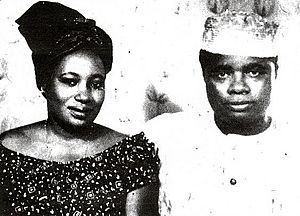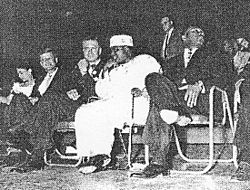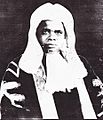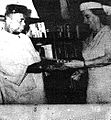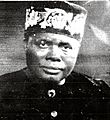Jaja Wachuku facts for kids
Quick facts for kids
Jaja Wachuku
|
|
|---|---|
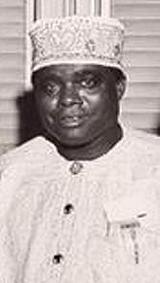 |
|
| Foreign Affairs and Commonwealth Relations Minister of Nigeria | |
| In office 1961–1965 |
|
| Prime Minister | Abubakar Tafawa Balewa |
| Preceded by | position established |
| Succeeded by | Nuhu Bamalli |
| Ambassador of Nigeria to the United Nations | |
| In office 1960–1961 |
|
| Governor-General | Nnamdi Azikiwe |
| Prime Minister | Abubakar Tafawa Balewa |
| Preceded by | position established |
| Succeeded by | Muhammed Ngileruma |
| Speaker of the House of Representatives of Nigeria | |
| In office 1959–1960 |
|
| Prime Minister | Abubakar Tafawa Balewa |
| Preceded by | Sir Frederic Metcalfe |
| Succeeded by | Ibrahim Jalo Waziri |
| Senator Representing Aba Zone Nigeria | |
| In office 1 October 1979 – 1 October 1983 |
|
| Preceded by | position established |
| Succeeded by | Position abolished |
| Personal details | |
| Born | 1 January 1918 Nbawsi, Southern Region, British Nigeria (now in Abia State, Nigeria) |
| Died | 7 November 1996 (aged 78) Enugu, Nigeria |
| Political party | National Council of Nigeria and the Cameroons; Nigerian People's Party |
| Spouse | Rhoda Idu Oona Onumonu |
| Alma mater | Trinity College Dublin at University of Dublin: Ireland |
| Profession | Lawyer |
Jaja Anucha Ndubuisi Wachuku (1 January 1918 – 7 November 1996) was an important Nigerian leader. He was a lawyer, politician, and diplomat. He worked to unite African nations and help people.
Wachuku made history as the first Speaker of Nigeria's House of Representatives. He was also Nigeria's first Ambassador to the United Nations. Later, he became Nigeria's first Foreign Affairs Minister. He came from a royal family in Ngwaland, Eastern Nigeria.
In the 1960s, when Nelson Mandela faced serious legal trouble in South Africa, Wachuku stepped in. As Nigeria's Foreign Affairs Minister, he helped save Mandela and others from the harshest punishments at the 1963–64 Rivonia Trial. Mandela even wrote about meeting Wachuku in his diary.
Nigeria has honored Wachuku for his great work. In 2010, President Goodluck Jonathan gave him a special award for his contributions to Nigeria's development. In 2014, he was honored again as a hero of Nigeria's independence struggle. In 2020, Trinity College Dublin in Ireland, where he studied, placed a portrait of him to celebrate his achievements.
Contents
- Jaja Wachuku's Early Life and Family
- Jaja Wachuku's Return to Nigeria and Political Career
- How did Jaja Wachuku start in Nigerian politics?
- Who was Jaja Wachuku's wife?
- What did Jaja Wachuku do as the first Speaker of the House?
- What was Jaja Wachuku's role at the United Nations?
- What did Jaja Wachuku do as Nigeria's first Foreign Affairs Minister?
- What did Jaja Wachuku do as Aviation Minister?
- What happened to Jaja Wachuku during the Civil War?
- What was Jaja Wachuku's role in the Second Republic?
- Honors and Awards for Jaja Wachuku
- When did Jaja Wachuku pass away?
- See also
- Images for kids
Jaja Wachuku's Early Life and Family
Who was Jaja Wachuku's family?
Jaja Anucha Wachuku's father was King Josaiah Ndubuisi Wachuku. He was a powerful chief and leader of all Ngwa people in Eastern Nigeria. Jaja's mother, Queen Rebecca Ngwanchiwa Wachuku, was a strong supporter of women's rights. She was also a kind landowner.
Jaja's family history is very old. His ancestor, Mgbawa, moved to their home in Nbawsi in the late 1600s. His grandfather, Wachuku Ogbaraegbe, was a respected merchant. He traded palm oil with King Jaja of Opobo. Jaja Wachuku was named "Jaja" to remember this friendship. His middle name, Anucha, means "after celebrating victory, you parade through their town."
Where did Jaja Wachuku go to school?
Jaja Wachuku started school at St. Georges NDP Umuomainta, Nbawsi. He was a band leader and prefect at Government School Afikpo. In 1930, he came first in his exams for the whole Ogoja Province. This earned him a scholarship to Government College Umuahia from 1931 to 1936. There, he was a House Prefect and played sports like tennis, cricket, and football. He also learned carpentry and metal work.
From 1936 to 1937, he had a scholarship to Yaba Higher College in Lagos. His father then sent him to Gold Coast (now Ghana) to study at People's College, Adidome. He later went to New Africa University College, Anloga. While there, he won a scholarship and a national prize for an essay on "How Can the People of the World Achieve Universal Disarmament?" After this, he went to Trinity College Dublin in Ireland.
What did Jaja Wachuku do in Dublin?
Jaja Wachuku was the first African to win an award for public speaking at Trinity College Dublin. He started studying there in 1939. In 1941, he joined the Executive Committee of the College Historical Society. He represented his university in debates. In 1944, he became a lawyer in Ireland.
He was very involved in Nigeria's fight for independence from Great Britain. He practiced law in Dublin for three years. Then, in 1947, he returned to Nigeria. He earned a first-class degree in law. He also researched international law at Trinity College. From 1947 until his death, he worked as a lawyer in Nigeria.
While in Dublin, Wachuku was active in the Student Christian Movement. He gave talks on many topics. From 1939 to 1943, he was secretary of the Association of Students of African Descent (ASAD) in Ireland. He became president of ASAD in 1944. In 1945, he represented ASAD at the fifth Pan-African Congress in England. He also started the Dublin International Club. He was its president from 1945 to 1947. He left the club when he returned to Nigeria to fight for independence. In 1947, he advised the National Council of Nigeria and the Cameroons (NCNC) on constitutional reforms. Trinity College Dublin later gave him an honorary law degree.
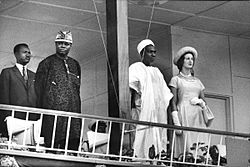
Jaja Wachuku's Return to Nigeria and Political Career
How did Jaja Wachuku start in Nigerian politics?
Wachuku came back to Nigeria in 1947 on the same ship as Nnamdi Azikiwe. He joined the NCNC party and became its legal adviser. He was known for his lectures in Lagos. In one lecture, he said Lagos was an "all-Nigerian city." This meant all Nigerians should have equal rights there.
From 1948 to 1952, he was a main secretary for the Igbo State Union. In 1949, he started a youth movement called the New Africa Party. This party joined the NCNC in 1950. He was also a co-founder of the African Continental Bank (ACB). He helped open new bank branches in different cities.
Wachuku started his political journey at the local level. In 1948, he became a village councilor. From 1949 to 1952, he was part of the Ngwa Native Authority. In 1951, he was elected to the Eastern Nigeria House of Assembly. From 1952 to 1953, he was Deputy Leader of the NCNC. He also chaired the Eastern Regional Scholarship Board.
In 1954, he lost an election but was re-elected later that year to the House of Representatives. In 1957, he became Deputy Leader of the opposition. He also served on the board of the Electricity Corporation of Nigeria. He chaired the board of Education in Eastern Nigeria.
In 1957, Wachuku led Nigeria's delegation to the Commonwealth Parliamentary Association meeting in India, Pakistan, and Sri Lanka. He also represented Nigeria in Liberia. From 1958 to 1959, he chaired the Business Committee in the House of Representatives. He also helped write a report on making the Federal Civil Service more Nigerian. In 1959, he was re-elected and became the first Nigerian Speaker of the House of Representatives.
Who was Jaja Wachuku's wife?
In 1951, Wachuku married Rhoda Idu Oona Onumonu (1920–1994). She called him "Anucha." Rhoda went to school in Nigeria and Ghana. She also studied in Scotland.
Jaja and Rhoda had five children: Chinedum, Nwabueze, Ndubuisi, Emenuwa, and Idu. After the Nigerian–Biafran Civil War, Wachuku adopted many orphans.
What did Jaja Wachuku do as the first Speaker of the House?
From 1959 to 1960, Wachuku was the first Nigerian Speaker of the House of Representatives. He took over from Sir Frederic Metcalfe. On 1 October 1960, he received Nigeria's Instrument of Independence from Princess Alexandra of Kent. She was Queen Elizabeth II's representative at Nigeria's independence ceremony.
During a 1960 tour of the United States, Wachuku received honors from the cities of Philadelphia and Atlanta. As Speaker, he strongly supported civil rights for African Americans and all people. He believed in true racial equality.
During this time, Wachuku became friends with three US Presidents: Dwight D. Eisenhower, John F. Kennedy, and Lyndon B. Johnson. He also knew other important leaders and people around the world.
What was Jaja Wachuku's role at the United Nations?
Time magazine called him "Nigeria's dynamic U.N. Ambassador." They said his energetic and wise diplomatic style made Nigeria a major force in Africa.
From 1960 to 1961, Wachuku was Nigeria's first Ambassador to the United Nations in New York. He was also the Federal Minister for Economic Development. On 7 October 1960, he raised Nigeria's flag as the 99th member of the United Nations. He also helped Nigeria become a member of UNESCO.
As Ambassador, Wachuku represented Nigeria at Tanganyika's (now Tanzania) independence celebration. At the UN, he was elected the first African to chair a United Nations Conciliation Commission. He led the commission for the Congo from January to March 1961.
Nigeria's Prime Minister, Sir Abubakar Tafawa Balewa, asked Wachuku to stay in New York as Ambassador. Wachuku had planned to return home, but he accepted the important role.
At the United Nations, he was known for his powerful speeches. He criticized major global powers for their disagreements. He said, "I am losing confidence in the great powers. They are climbing from the pedestal of greatness to the pedestal of insanity."
Under Wachuku's leadership, the Nigerian Army and Police Force first joined UN peacekeeping efforts. Nigeria's Major-General Johnson Aguiyi-Ironsi became Commander of the UN Peacekeeping Force in the Congo. Wachuku also helped secure the appointment of the first African Under-Secretary-General of the United Nations, Nigeria's Godfrey K. J. Amachree.
What did Jaja Wachuku do as Nigeria's first Foreign Affairs Minister?
In 1961, Wachuku became Nigeria's first Minister of Foreign Affairs. He held this position until 1965. Before him, Prime Minister Balewa handled foreign affairs.
In 1962, he received an award from the President of Niger Republic. As Foreign Affairs Minister, Wachuku helped African and Asian countries work together at the UN. He worked to get Liberia elected to the United Nations Security Council and Ethiopia to the United Nations Economic and Social Council. He also helped change the UN Charter to increase the Security Council from eleven to fifteen members, giving more voice to African nations.
An American diplomat, Ambassador Owen W. Roberts, noted that Wachuku was very assertive. He demanded respect for Nigeria and other African nations. Roberts said Nigerians were "very independent" and "always open."
Wachuku preferred "quiet diplomacy" to solve international problems. For example, during the Rivonia Trial in South Africa in 1963, Nelson Mandela and others faced severe penalties. Wachuku quietly asked British and US ambassadors to speak with the South African government. He urged them not to impose the harshest punishments. He also spoke with the US Secretary of State and the British Foreign Secretary.
Because of these efforts, Lionel Bernstein was found not guilty. Mandela and the others received life imprisonment instead of the death penalty. Professor Kenneth S. Broun wrote in his book Saving Nelson Mandela that Wachuku's request was crucial. The South African Foreign Minister respected Wachuku and his view that "white people were also Africans." This helped ensure the death sentences were not carried out.
Wachuku had a strong sense of history. Prime Minister Balewa often told him he was years ahead of his colleagues. For example, in 1947, Wachuku said Lagos was an "all-Nigerian city" long before it became a federal territory.
He also saw the danger of military coups. In 1963, he refused to recognize the new government in Togo after its first military coup. He believed that if this coup was accepted, more coups would happen in Africa. At the first Organization of African Unity (OAU) conference in Addis Ababa, he stood firm. Togo was the only independent African country not represented because of his stance. History showed he was right, as coups later spread across Africa. Even Kwame Nkrumah, who supported the Togolese coup, later became a victim of a coup himself. Wachuku resigned from government on 14 January 1966, just hours before Nigeria's first military coup.
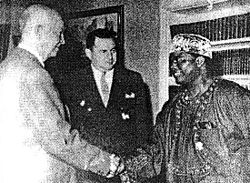
What did Jaja Wachuku do as Aviation Minister?
From 1965 to January 1966, Wachuku was Nigeria's Minister of Aviation. Many aviation laws in Nigeria still bear his signature. He started training programs for Nigeria's first flight and ground officers. The Aviation Training Centre in Zaria was built during his time.
Wachuku was very honest and strict. He fired the chairman of the Nigeria Airways Board, who was also a leader in his party, the NCNC. The NCNC demanded the chairman be reinstated. This caused a big problem for the government.
Prime Minister Balewa asked Wachuku to reinstate the chairman and take another ministry. Wachuku refused. He even refused his wife's pleas. He resigned from Parliament and the government on 14 January 1966. Just 12 hours later, the army took over, starting the era of military coups in Nigeria. Soldiers surrounded Wachuku's home. He was safe because the soldiers respected him for being an honest minister.
What happened to Jaja Wachuku during the Civil War?
Wachuku returned to his hometown during the Nigerian–Biafran War (1967–1970). He supported his Igbo people's fight for freedom. However, he disagreed with the Biafran government leader, Chukwuemeka Odumegwu Ojukwu, because he spoke out against using child soldiers. He was arrested and held by Ojukwu's government.
At the end of the war, a Nigerian Army Officer, Theophilus Danjuma, released him. The Nigerian soldiers were surprised to find their first Speaker and Foreign Minister in detention. They protected him and helped him save his large library at his home in Nbawsi. His library was known as the biggest private library in West Africa. Prime Minister Balewa used to call Wachuku the most "Bookish Minister."
After the war, Wachuku worked on community development. He chaired the Nbawsi and Umuomainta Town Council. He also helped create Imo State and led the movement for the creation of Aba State.
What was Jaja Wachuku's role in the Second Republic?
During Nigeria's Nigerian Second Republic (1979–1984), Wachuku was elected Senator twice (1978 and 1983). He represented the Aba Senatorial Zone. In the Senate of Nigeria, he became the leader of the Nigerian Peoples Party (NPP). He also chaired the Senate Foreign Relations Committee.
During this time, he made secret trips to South Africa. He met with President Pieter Willem Botha to pressure him to end the apartheid system. He also pushed for the release of Nelson Mandela and other political prisoners.
In the Senate, Wachuku famously said that apartheid would end through "dialogue and contact," not through "isolation and guns." He was later removed from the Foreign Relations Committee for calling for talks with South Africa. In the 1990s, when Nigeria started diplomatic relations with South Africa, many politicians said Wachuku deserved an apology. He was re-elected to the Senate in 1983 but lost his seat after the Muhammadu Buhari military coup in December 1983.
Honors and Awards for Jaja Wachuku
Jaja Wachuku received many honors. In Nigeria, he held the chieftaincy title of Ugo Ngwa, meaning Eagle and Pride of Ngwa People. He received this title in 1949, but was formally invested in 1971.
Other honors include:
- City of Philadelphia, Pennsylvania Blue Seal
- Key to the City of Atlanta, Georgia
- Time magazine's "Pride of Africa" Commendation
- Commander of the Order of Niger Republic
- CFR Nigeria: Commander of the Order of the Federal Republic of Nigeria
- LL.D: Doctor of Laws Honoris Causa by Trinity College Dublin, University of Dublin, Ireland
- KSC: Knight of Saint Christopher by the Anglican Church Nigeria
- Enyi Abia (or Elephant of Abia), an Abia State chieftaincy title symbolizing wisdom and strength
- A Merit Award from the Government of Abia State
After his death, President Goodluck Jonathan gave him a special Golden Jubilee Independence Anniversary Award in 2010. In 2014, he was honored as a Hero of Nigeria's Independence Struggle. In 2020, Trinity College Dublin honored him with a "Prominent Portrait" for his contributions.
When did Jaja Wachuku pass away?
Jaja Wachuku was born in 1918 and passed away at age 78. He died at the University of Nigeria Teaching Hospital in Enugu on 7 November 1996. His nephew, Ugonna Wachuku, wrote a poem dedicated to him. In 1961, Time magazine published an article about Wachuku called "Pride of Africa."
See also
- Nigerian First Republic
- Nigerian Second Republic
- Chuku Wachuku
- Nwabueze Jaja Wachuku
- History of Nigeria
Images for kids
 | Anna J. Cooper |
 | Mary McLeod Bethune |
 | Lillie Mae Bradford |


